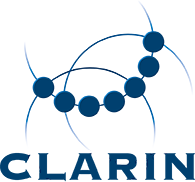Research Programs and Projects

In industry, data-driven techniques have revolutionized manufacturing by collecting huge amounts of information during production and turning it into valuable information for process optimization. While machine learning (ML) is a key technology and the main contributing factor for many recent success stories, we witness the transition of ML moving from the “virtual world” into “the wild”; this includes prominent applications in autonomous navigation, the Internet of Things, and Industry 4.0 applications. Evidently, this transition opens several real-world challenges for ML that need to be addressed for closing the gap between both worlds.

CLARIN is the Common Language Resources and Technology Infrastructure, which provides easy and sustainable access for scholars in the humanities and social sciences to digital language data (in written, spoken, video or multimodal form), and advanced tools to discover, explore, exploit, annotate, analyse or combine them, wherever they are located. CLARIN is building a networked federation of language data repositories, service centres and centres of expertise, with single sign-on access for all members of the academic community in all participating countries. Tools and data from different centres are interoperable, so that data collections can be combined and tools from different sources can be chained to perform complex operations to support researchers in their work.
Impaired speech production poses significant communication hurdles, often impacting career prospects and quality of life. This project envisions (i) the prediction of effects of clinical treatment of impaired speech, and (ii) a better sounding substitution speech, i.e., electrolarynx (EL) speech, for individuals with otherwise unfavorable prospects.
Objectives:
Objective 1 is to predict post-treatment speech audio recordings, i.e., readings of a German standard text. Input data is paired text-parallel pre-treatment speech audio recordings, and electronic patient records (EPRs), i.e., unstructured textual clinical reports containing information about the speech impairment and treatment plan.
Objective 2 is to improve speech of larygectomees in...
Recent advances in sensor technology have paved the way for multi-sensor systems to become a practical and cost-effective solution across a range of industries, including mobile radio systems, energy grids, and autonomous vehicles. These systems improve perception, reliability, and robustness by integrating diverse sensors; however, they introduce new challenges regarding effective joint processing. Traditional multi-sensor processing methods rely either on classical analytical techniques or purely data-driven approaches, such as deep learning. While analytical methods may miss crucial data from individual sensors, data-driven models require large volumes of high-quality data and often lack interpretability. Achieving coherent multi-sensor processing requires overcoming environmental...
Gas pipelines and power lines are part of the critical civil infrastructure of a country. Fibre Optic Monitoring of linear distribution infrastructure is done using Distributed Acoustic Sensing (DAS). New methods of pipeline monitoring are developed and evaluated in field trials.
Finished Programs
- 2019 — 2025: Christian Doppler Laboratory for Location-aware Electronic Systems
- 2016 — 2021: Dependable Internet of Things in Adverse Environments
- 2013 — 2017: COMET K-Project Acoustic Sensing and Design (FFG 836632)
- 1998 — 2014: Telecommunications Research Center Vienna
- 2008 — 2013: National Research Network Signal and Information Processing in Science and Engineering
- 2010 — 2013: Design Methods for Radio Architectures Going Nanoscale
- 2008 — 2013: COMET K-Project Advanced Audio Processing
- 2006 — 2010: Competence Network for Advanced Speech Technologies
- 2002 — 2009: Christian Doppler Laboratory for Nonlinear Signal Processing
Finished Projects
- 2022 — 2026: Hybrid20 - Fundamentals for integrated computational material, process and product engineering
- 2019 — 2024: Cross-layer language models for conversational speech (FWF Stand-Alone Project P 32700-N)
- 2021 — 2024: REPAIR - Robust and ExPlainable AI for Radarsensors
- 2018 — 2024: Dysphonic - Objective differentiation of dysphonic voice quality types (FWF-KLI722-B30)
- 2023 — 2023: DNN4Rail - Physics-informed Neural Networks for Multibody Dynamics Simulation and its Application to Railway Vehicles
- 2020 — 2023: SEAMAL Front - Sicher angewandtes maschinelles Lernen
- 2021 — 2022: InterCEPT - Interference Mitigation Concepts and Efficient Processing
- 2020 — 2022: Inference - General Framework for Inference on Graphical Models
- 2020 — 2022: TUNE-IN
- 2018 — 2021: Cross-layer prosody models for conversational speech (FWF Elise Richter Grant V638-N33)
- 2016 — 2020: Resource-Efficient Deep Models for Embedded Systems
- 2017 — 2020: UB Smart - UWB based Smart Access Platform
- 2017 — 2020: SAHaRA - Smart Accelerated Hardware for Radar Sensors enabling Autonomous Driving
- 2020 — 2020: MediumHop - Communication system for harsh environments
- 2018 — 2020: FWF - Location-Aware Radios - Cognitive Dynamic Systems for Location-Aware Radios
- 2015 — 2019: Speech signal processing Lab (research group)
- 2016 — 2019: PipeSense - Gas pipelines
- 2017 — 2019: KONDE - Kompetenznetzwerk Digitale Edition
- 2019 — 2019: JoViAAI - High Fidelity Channel Modelling for GNSS Receiver Performance Characterization
- 2015 — 2019: FWF - Phase - Phase-Aware Signal Processing for Speech Transmission
- 2016 — 2019: Dependable Wireless Communication and Localization
- 2017 — 2019: ARCHIMEDES - Automatic and Reliable Classification of Highly Inline Measured Wafer Edge Defects using Embedded Screeners
- 2018 — 2019: aiMotion - Artificial Intelligence in Motion Laboratory
- 2015 — 2018: HumanEVoice -- Gender-appropriate human voice using an artificial larynx (FFG 849824)
- 2017 — 2018: Monitoring of Mars Isolation Crew by Speech Processing and Psychological Content Analysis (MIMIC)
- 2015 — 2018: Learning of Bayesian Network Classifiers and Sum- Product Networks
- 2017 — 2018: iPOS - Indoor Positioning
- 2017 — 2018: FWF - Markov - Information-Theoretic Markov Aggregation
- 2017 — 2018: Evaluation tool for plain language
- 2018 — 2018: Capito - LL-Evaluation Tool
- 2014 — 2017: REFlex - RFID Real-Time Localization for Flexible Production Environments
- 2015 — 2017: ENTRANCE - Enhanced(radio) TRANsmitter and Coexistence Exploration
- 2014 — 2017: ENTRANCE - Enhanced Radio Transmitter and Coexistence Exploration
- 2012 — 2017: Cross-layer pronunciation modeling for conversational speech (FWF Hertha Firnberg Program T572)
- 2013 — 2016: Probabilistic Graphical Models for Time-Series Signal Mixtures
- 2014 — 2016: CULA - Computerized Lung Sound Analysis
- 2014 — 2016: Computerunterstützte akustische Diagnostik thorakaler Erkrankungen
- 2014 — 2016: CAPA - Psychological Status Monitoring by Content Analysis and Acoustic-Phonetic Analysis of Crew Talks and Video Diaries
- 2013 — 2015: SPORAU - Spectral Decimation, Psychoacoustically Optimized Requantization and Coding of Audio Signals
- 2015 — 2015: SECOP-HR - CC2018 - Advanced Development Cooling Compressor 2018 - Reverberation Room
- 2009 — 2015: Klassenraumakustik
- 2014 — 2015: GeweSchlAku - Evaluation of the feasibility of a new production of fabric tubes with special acoustic properties
- 2011 — 2014: Signal and Information Processing in Science and Engineering - Nonlinear Dynamic and Machine Learning (SISE-NDML-II) FWF S10610-N13
- 2012 — 2014: ILCM - Indoor Localization and Channel Modelling
- 2011 — 2014: FWF - SISE-NDML-2 - Signal and Information Processing in Science and Engineering - Nonlinear Dynamic and Machine Learning - 2
- 2011 — 2014: ELARYNX - Speaking Aid for Laryngectomized People
- 2012 — 2014: DIRHA - Distant-speech Interaction for Robust Home Applications
- 2013 — 2013: Zugin2 - Accordion Tuner for Single Reeds and the Beat of Polychoric Reeds
- 2010 — 2013: NOFDM - Noncoherent Orthogonal Frequency Division Multiplexing
- 2011 — 2013: Lobster - Analysing Escaping Groups
- 2010 — 2013: DRAGON - Design methods for Radio Architectures GOing Nanoscale
- 2010 — 2013: Discriminative Learning of Graphical Models with Application to Speech and Image Processing
- 2013 — 2013: Acoustics 2013 - CC2018 - Advanced Development Cooling Compressor 2018
- 2008 — 2013: AAP-COMET Advanced Audio Processing (FFG 815085)
- 2011 — 2012: Signal authentication utilizing a dual frequency software-based GNSS receiver for trusted positioning (SoftGNSStrusted)
- 2010 — 2012: GreenPArK - Green Power Amplifiers (Zukunftsfonds Steiermark - PN 5061)
- 2008 — 2011: Signal and Information Processing in Science and Engineering - Nonlinear Dynamic and Machine Learning (SISE-NDML-I) FWF S10604-N13
- 2007 — 2011: PARIS - Position Aware RFID Systems
- 2006 — 2011: COST 2103 - Advanced Voice Function Assessment
- 2004 — 2010: Speech Watermarking for Security Applications
- 2009 — 2010: SoftGNSS 2 - A Dual frequency software-based GNSS reciever
- 2009 — 2010: SoftGNSS 2-A dual frequency software-based GNSS receiver
- 2006 — 2010: Singel Channel Source Separation
- 2006 — 2010: ROBUST - Signal processing for robust speech quality (COAST)
- 2008 — 2010: GALILEO - GALILEO client - Paving the way for embedded Galileo based mobile solutions
- 2007 — 2010: Discriminative Learning of Bayesian Network Classifiers
- 2007 — 2010: COMAR - Communication and Positioning Methods in Active RFID
- 2006 — 2010: ALSO - Automatic learning and specific adaptation (COAST - Competence Network for Advanced Speech Technologies)
- 2008 — 2010: ASR for Telehealth Applications (COAST)
- 2007 — 2009: SPR - Signal Processing for Ranging
- 2003 — 2009: Speech Watermarking for Air Traffic Control Communication
- 2005 — 2009: PROACT - Programme for Advanced Contactless Technology
- 2000 — 2009: Nonlinear Prediction of Mobile-Radio Fading Processes
- 2008 — 2009: Digitale Signalverarbeitung für Datenumsetzer
- 2002 — 2009: CD-Laboratory for Nonlinear Signal Processing
- 2006 — 2009: CD-Laboratory for Nonlinear Signal Processing, Module F: Digital synthesizers for gigahertz-range fast frequency-hopping systems (Phase-Locked-Loop - PLL)
- 2006 — 2009: CD-Laboratory for Nonlinear Signal Processing, Module D: Digital synthesizers for gigahertz-range fast frequency-hopping systems
- 2002 — 2009: CD-Laboratory for Nonlinear Signal Processing, Module B: Digital Correction of Analog Signal Processing Errors in Fast Analog-to-Digital Converters (ADC)
- 2002 — 2009: CD-Laboratory for Nonlinear Signal Processing, Module A: Nonlinear Signal Processing in xDSL Systems
- 2003 — 2009: CD-Laboratory for Nonlinear Signal Processing, Module C: Digital Predistortion of RF-Power Amplifiers for UMTS (Universal Mobile Telecommunications System) Base-Stations
- 2006 — 2008: OneVoice - Speech Enhancement for Dictation Systems
- 2004 — 2008: EUROPCOM - Emergency Ultra-Wideband Radio for Positioning and Communications
- 2005 — 2008: CD-Laboratory for Nonlinear Signal Processing, Module E: Ultra-Wideband (UWB) Communications
- 2005 — 2007: SonEnvir - Eine Sonifikationsumgebung für wissenschaftliche Daten
- 2006 — 2007: Perceptual-Domain Coding of Speech and Audio
- 2005 — 2006: SPARC FIT-IT - Semantic Phonetic Automatic ReConstruction of dictations
- 2004 — 2006: SNOW - Services for NOmadic Workers
- 2005 — 2006: MISTRAL - Measurable intelligent and secure semantic extraction and retrieval of multimedia data
- 2005 — 2006: Efficient I/A Representation of Nonlinear Systems
- 2003 — 2006: Description and Classification of 3-D Surfaces
- 2001 — 2005: COST Action 277 - Nonlinear Speech Processing
- 2002 — 2004: Shape Description and Analysis of Range Data for Surface Inspection Applications
- 1999 — 2003: Oscillator-plus-Noise Modeling of Speech Signals
- 2001 — 2003: COMMIT Convergence in Multimedia Internet Transport
- 2002 — 2002: Acoustic Signal Processing and Noise Analysis for the Localization of Leaks in Water Pipes
- 2002 — 2002: Three-Dimensional Audio Interfaces for the Blind and Visually Impaired
- 2001 — 2002: Nonlinear Signal Processing for xDSL Systems
- 2000 — 2001: The Naturalness of Synthetic Speech
- 2000 — 2000: Speech & More
- 2000 — 2000: Anthropomorphic Coding of Speech and Audio
- 1997 — 1997: Broadband Wireless Communications
